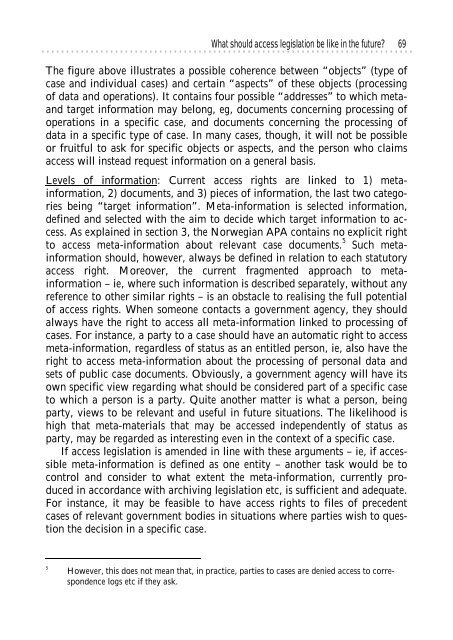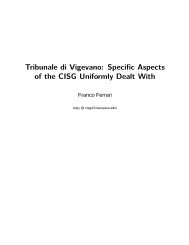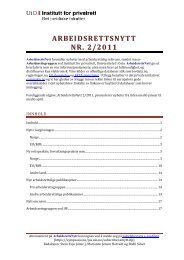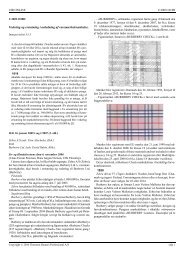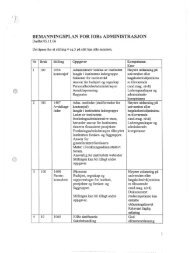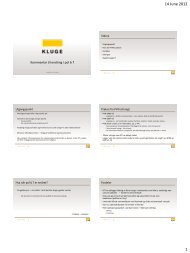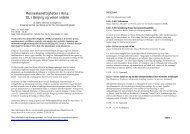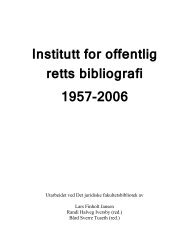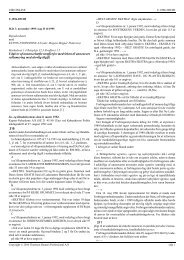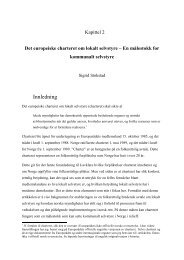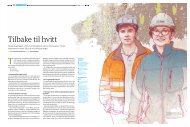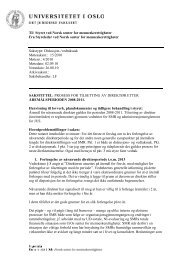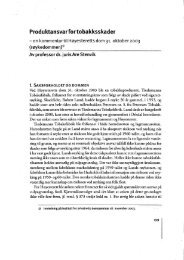Lee A. Bygrave (red.) YULEX 2002 - Universitetet i Oslo
Lee A. Bygrave (red.) YULEX 2002 - Universitetet i Oslo
Lee A. Bygrave (red.) YULEX 2002 - Universitetet i Oslo
Create successful ePaper yourself
Turn your PDF publications into a flip-book with our unique Google optimized e-Paper software.
............................................................................<br />
What should access legislation be like in the future? 69<br />
The figure above illustrates a possible coherence between “objects” (type of<br />
case and individual cases) and certain “aspects” of these objects (processing<br />
of data and operations). It contains four possible “addresses” to which metaand<br />
target information may belong, eg, documents concerning processing of<br />
operations in a specific case, and documents concerning the processing of<br />
data in a specific type of case. In many cases, though, it will not be possible<br />
or fruitful to ask for specific objects or aspects, and the person who claims<br />
access will instead request information on a general basis.<br />
Levels of information: Current access rights are linked to 1) metainformation,<br />
2) documents, and 3) pieces of information, the last two categories<br />
being “target information”. Meta-information is selected information,<br />
defined and selected with the aim to decide which target information to access.<br />
As explained in section 3, the Norwegian APA contains no explicit right<br />
to access meta-information about relevant case documents. 5 Such metainformation<br />
should, however, always be defined in relation to each statutory<br />
access right. Moreover, the current fragmented approach to metainformation<br />
– ie, where such information is described separately, without any<br />
reference to other similar rights – is an obstacle to realising the full potential<br />
of access rights. When someone contacts a government agency, they should<br />
always have the right to access all meta-information linked to processing of<br />
cases. For instance, a party to a case should have an automatic right to access<br />
meta-information, regardless of status as an entitled person, ie, also have the<br />
right to access meta-information about the processing of personal data and<br />
sets of public case documents. Obviously, a government agency will have its<br />
own specific view regarding what should be conside<strong>red</strong> part of a specific case<br />
to which a person is a party. Quite another matter is what a person, being<br />
party, views to be relevant and useful in future situations. The likelihood is<br />
high that meta-materials that may be accessed independently of status as<br />
party, may be regarded as interesting even in the context of a specific case.<br />
If access legislation is amended in line with these arguments – ie, if accessible<br />
meta-information is defined as one entity – another task would be to<br />
control and consider to what extent the meta-information, currently produced<br />
in accordance with archiving legislation etc, is sufficient and adequate.<br />
For instance, it may be feasible to have access rights to files of precedent<br />
cases of relevant government bodies in situations where parties wish to question<br />
the decision in a specific case.<br />
5<br />
However, this does not mean that, in practice, parties to cases are denied access to correspondence<br />
logs etc if they ask.


